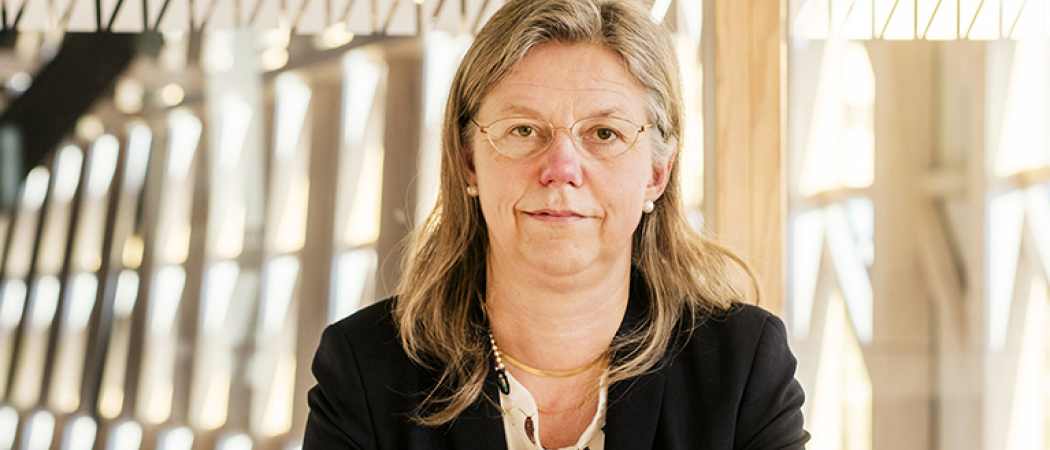Karolinska Institute’s Karin Dahlman-Wright, who resigned as vice president this month and awaits the final verdict on her future, tells Science|Business she has a ‘clear conscience’ over errors in published research papers

Photo: Karolinska Institutet
The eminent cancer researcher at the centre of an alleged scientific misconduct investigation at Sweden’s Karolinska Institute (KI) admits mistakes were made in published research articles, but says they don’t amount to misconduct.
Karin Dahlman-Wright resigned her position as vice president of the university on 9 September following an investigation by the University of Gothenburg that found “serious errors” in several published articles. She remains at the university as a professor of molecular endocrinology awaiting a final verdict on her future.
The reports of misconduct, submitted to KI during the summer of 2018, concerned “suspicions” of incorrect images in scientific articles.
Dahlman-Wright denies all allegations of misconduct and vows to fight on. “We always try to do our best. People make mistakes; we correct them as soon as we find them. It’s the way we handle the mistakes that matters,” she told Science|Business.
Of the 10 published research articles that were scrutinised, the report flagged two as potentially "suspicious of errors in imaging and suspicious of using incorrect images."
The KI statement in response to this finding said, “Karin Dahlman Wright is considered to share responsibility for one of these articles.”
The incorrect images did not affect the study’s conclusions, Dahlman-Wright said. “I object to the idea that it should be treated like research misconduct. I have a good conscience.”
For example, in one of the research papers, which analysed a variety of different gene expression profiles, the investigation found duplicated images.
Dahlman-Wright explained that the mix up owed to the fact that the images “were very similar to each other”.
The report says the overall impression of is “that good research practices did not seem to be the norm” in the production of these articles.
In a blog posting, Dahlman-Wright noted that the mistakes "have been corrected in the respective journals."
KI president Ole Petter Ottersen is expected to make the final decision on Dahlman-Wright’s future at the university. She says she expects “an objective decision”. Ottersen’s office said it would not comment on an ongoing investigation.
The saga has been “very sad and disappointing,” Dahlman-Wright says. “I will continue to work in life sciences. How and when remains to be seen.”
She suggests she is a casualty of the deep soul-searching and change that has swept through the university following the devastating scandal surrounding superstar surgeon Paolo Macchiarini.
KI fired Macchiarini in 2016 for multiple ethical violations, following a long running investigation. There have since been several high profile resignations from KI.
“I believe I would never have been examined like this had the Macchiarini affair not happened,” Dahlman-Wright said.
Macchiarini, originally feted as a visionary, led surgeries to implant artificial tracheae seeded with a patient’s own stem cells in several patients between 2011 and 2014. Six of the eight recipients have since died.
In 2014, colleagues at KI raised questions about Macchiarini’s research. That eventually led to the misconduct investigation, with then vice-chancellor Anders Hamsten clearing Macchiarini of the charges.
The ever-widening scandal, which tarnished the reputation of Karolinska, saw Hamsten resign in 2016. "I failed to see the warning signs,” Hamsten said at the time. “Confidence in me as vice-chancellor of KI has been impaired both among the public, the research community and KI's staff and students.”
The same year, geneticist Urban Lendahl, one of the scientists at KI who recommended hiring Macchiarini in 2010, resigned as secretary-general of the Nobel Prize Assembly. The dean of research Hans-Gustaf Ljunggren and medical professor Jan Carlstedt-Duke also stepped down.
Dahlman-Wright was chosen as Hamsten’s successor.
Her task was to help restore stability to the university. “This is where we start trying to rebuild the confidence we have lost,” then university board chairman Lars Leijonborg said at the time. “We’re convinced that Karin Dahlman-Wright is the right person to take on this responsibility.”
Leijonborg, a former minister for Higher Education and Research, later resigned, citing the need for a fresh start after the Macchiarini scandal.
Among her duties, Dahlman-Wright oversaw new procedures for handling cases of suspected misconduct in research.
In 2018, the board decided to extend her contract until February 2022. In an interview marking the appointment with the in-house KI news service, she said, “It’s exciting; I’ve learned that you never know what will happen next.”
One year later, Dahlman-Wright in her blog reflects on “the many interesting activities and plans” she won’t now get to pursue. “But life goes on, and KI is much bigger than any individual.”
Article was altered on 19 September to make it clear that while 10 papers were investigated, an error with an image in only one of these was attributed to Karin Dahlman-Wright and another author.




 A unique international forum for public research organisations and companies to connect their external engagement with strategic interests around their R&D system.
A unique international forum for public research organisations and companies to connect their external engagement with strategic interests around their R&D system.